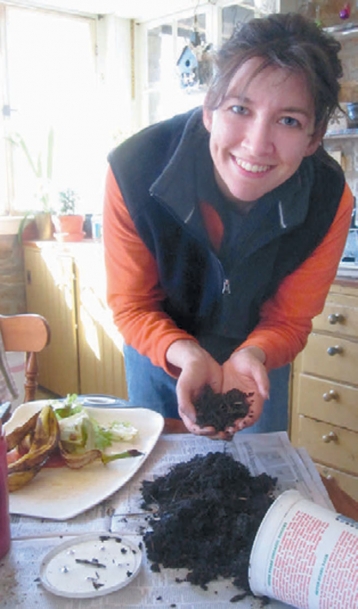Ways to Reduce Food Waste in Your Home
This issue really excites me. Whenever I feel passionately about a topic, I want the content to be perfect. This desire can be paralyzing – in terms of production – to try to include everything intended regarding a specific subject. I assure you we have not been successful in including everything I had hoped. We have, however, put together a fascinating issue about some of the most important food-related topics this country is facing: waste reduction, composting, and soil nutrition.
I enjoyed reading The Waste Free Kitchen Handbook by Dana Gunders (review by Amber Alexande). I give it a thumbs-up for practical content and inspiration. The book is geared toward beginners wanting to make a shift to reduce household waste, but I think most people could glean something from it. I love that the directory includes instructions on how to use food by cross-referencing recipes in the book, as well as providing food storage advice.
I was grateful for little tips, such as the fact that you can sauté lettuce greens just as you do other greens. This is a simple concept, but I have tossed many a half-eaten tub of greens because I had intended to eat more salads in a given week than reality allowed. I share my personal journey toward a kitchen that produces less waste on page 41.
It is fun to be able to share personal interests with a broader range of people. I am proud to be a Washington County master gardener and master composter. In Michelle Parks’ story (page 35), she interviews Joyce Starr, a fellow master composter, and reports on the joys of using red wigglers to compost kitchen scraps.
As we turn our attention toward spring, it is tempting to start a garden. Zoë Rom walks us through what we need to know regarding soil nutrition, so we do not treat our soil like “dirt.”
It is my pleasure for us to revisit the craft beer scene in Ozarkansas. In this issue, Darinda Sharp profiles Hogshead Tours, the guaranteed cutest Volkswagen van tour company around; and Morgan Scholz introduces us to Creekside Taproom, which I am proud to report serves exclusively Arkansas wine and beer.
One of the most memorable experiences in producing this issue was being on site as we photographed the dumping of food waste for the composting pilot program in Fayetteville (page 9). The food still smelled appetizing. The pasta, pizza, and several other items still smelled as though they had just been served. The greens had not yet withered. A mostly whole apple rolled from the pile onto the pavement near my foot. It is confusing how it could be waste. Yet, I am aware that up to 40 percent of edible food winds up in waste receptacles throughout our countr).
I hope that something in this issue will cause you to pause and think differently about how you interact with your food. Then, perhaps, you will influence a friend, and they will influence a friend. In this manner, individuals have the power to change the world.





